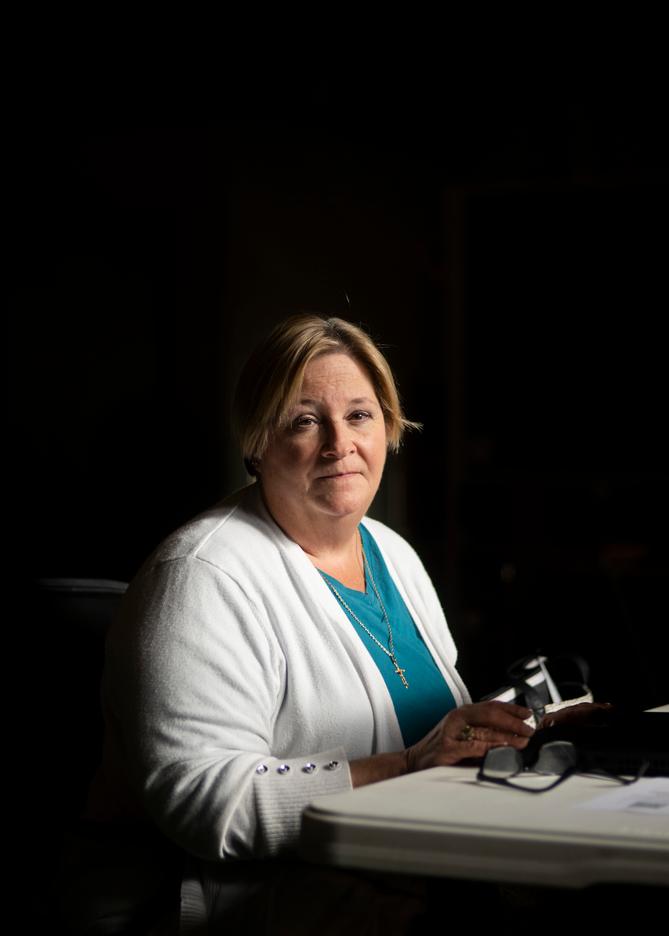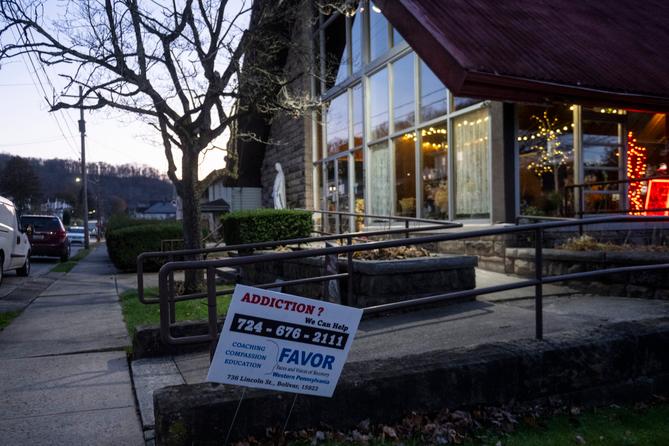Spotlight PA is an independent, nonpartisan, and nonprofit newsroom producing investigative and public-service journalism that holds power to account and drives positive change in Pennsylvania. Sign up for our free newsletters.
BOLIVAR — Kim Botteicher decided to speak out about her work offering syringe services in Westmoreland County, hoping to prompt change that she believes would help save lives.
But after she went public, county government officials pulled $150,000 in opioid settlement funding they had approved for her organization — money Botteicher said she planned to spend on hiring additional staff to work with people who are dealing with addiction and recovery, as well as their families. None of the funds would have gone to syringe services, she said in January.
“We need it desperately,” Botteicher said of the money.
The funding gap complicates plans for her nonprofit to provide emergency housing and other community programs, said Botteicher. FAVOR ~ Western PA, a recovery community organization that runs support groups, is based in a cloistered pocket of rural Pennsylvania that lacks a number of safety net services.
Botteicher's situation highlights a conflict between Pennsylvania laws and practices backed by leading medical groups, and it shows how local leaders are now left in charge of weighing the public health and legal consequences as they decide how to spend the state’s windfall from settlements with opioid companies.
Syringe services programs — which offer needles and other supplies that make it less risky to inject drugs — have widespread support in the medical community. The CDC says nearly 30 years of research shows comprehensive syringe services programs “are safe, effective, and cost-saving, do not increase illegal drug use or crime, and play an important role in reducing the transmission of viral hepatitis, HIV and other infections.” The programs also can connect people to recovery services.
Expanding syringe services is listed as one of the “Core Strategies” for the tens of billions of dollars coming to states as part of settlements with drug companies for their role in allegedly fueling the opioid epidemic. A coalition of state attorneys general, including now-Gov. Josh Shapiro, negotiated the agreements.
But Pennsylvania’s drug paraphernalia law makes it significantly harder for opioid settlement money to directly support expanding syringe services in many places. People who run syringe services programs often must do so in the shadows, as they risk arrest. The programs are widely considered illegal in most of the state.
“It’s just a huge inconsistency,” said Zoe Soslow, who leads overdose prevention work in Pennsylvania for the public health organization Vital Strategies. “It’s causing a lot of confusion.”
Soslow and other supporters of expanding syringe services say the situation in Westmoreland County highlights the need to change state law.
“It’s fundamentally the problem we have in PA and still some other states where the legal doubts about syringe exchange have not been completely erased, even after 30 years of successful life-saving operation,” said Scott Burris, an attorney and director of the Center for Public Health Law Research at Temple University.
Westmoreland County officials acknowledged legal concerns were a factor in their decision to pull FAVOR’s funding. Commissioner Douglas Chew told Spotlight PA and WESA that the county “is very risk-averse.”
“There’s a lot of gray area in this, and if we were to end up in a lawsuit, the litigation costs would be enormous,” said Chew. “And it’s just not worth taking that risk on for my taxpayers.”
While syringe services are on the list of approved and recommended uses for opioid settlement money, Chew said, “the state of Pennsylvania doesn’t seem to be aligned with that.”
“And we would, as a county government, have to follow all of the laws within our commonwealth,” he added.
Funding pulled
Last November, Spotlight PA and WESA featured Botteicher in a story examining the conflict about syringe services in the state. As the executive director of FAVOR, Botteicher helps people in addiction and recovery find housing and jobs, and connects them with long-term treatment. She told Spotlight PA and WESA that providing syringes is a way to support people in “a very whole way” and to minimize harm.
But syringes ultimately caused problems for her.
In October 2023, county commissioners approved providing $150,000 to FAVOR as part of the county’s opioid settlement plan. Meeting minutes described the money as part of the funding to “Recovery Community Organizations for Community Peer Support.” Documents from the opioid settlements between states and drug companies describe approved uses for the funds, and they specifically include peer support services and counseling, along with connections to community-based services.
The October meeting minutes and related resolution did not mention syringe services. Botteicher told Spotlight PA and WESA in November that she had other money and resources available to offer syringe services, separate from the opioid settlement funds from the county.
But on Dec. 21, county commissioners unanimously approved rescinding the agreement with FAVOR, meeting minutes show.
“It’s incredibly disheartening,” said Soslow of Vital Strategies.
Vital Strategies is providing funding to FAVOR for an electronic health record system to help the organization track the services it delivers. Financial support from Vital Strategies will also go toward the purchase of a vehicle that will help FAVOR take people to doctor’s appointments, court dates, and other places they need to go.
“FAVOR is in an incredibly rural part of the state with an immense need,” said Soslow. “They’re doing incredible work saving people’s lives.”

In January, Botteicher celebrated FAVOR’s expansion into a second location in Bolivar. The organization purchased a former Methodist church, which Botteicher intends to use as an emergency shelter. She said a person waiting to enter treatment recently stayed overnight at the building, sleeping on a couch. And Botteicher has bigger plans, including renovating the building.
The goal is to help others who are waiting to get into detox and treatment programs, as well as individuals and families waiting for permanent housing.
But maintaining a shelter would require at least occasional overnight employees, estimated Botteicher, who said her current staff who provide recovery assistance are already “stretched to the max.” The loss of county funding leaves FAVOR unable to hire two more employees as planned, she said.
The former church would also be open to the broader community, not only those seeking help for addiction issues, Botteicher said. She imagines the building functioning like a senior center, where people can play cards, do a puzzle, and participate in a book club.
The building is already being used to host meetings for a youth program, but Botteicher said in an email that “without the extra employees I don't even have the staff to open it up for the seniors and the community every day.”
She plans to pursue other funding options.
“We will keep plugging away,” she said. “That’s not going to change.”
Rob Hamilton, director of human services for Westmoreland County, was one of the featured speakers at the FAVOR celebration in January, during which he discussed his own long-term recovery. He said he hopes opioid settlement money goes to Botteicher’s peer-support work in the future.
“We need recovery organizations like this here, ready, willing, and able to assist those that need it the most,” Hamilton said of FAVOR.
Tim Phillips, the director of a Westmoreland County department tasked with reducing the impact of opioid addiction and preventing the spread of communicable diseases, also showed up in Bolivar to celebrate FAVOR. He said the decision to cut its funding was “unfortunate,” but necessary given the legal status of syringe services in the state.
Phillips told Spotlight PA and WESA that he’d like to see local officials find a way to allow syringe services, which officials in Philadelphia and Allegheny County did decades ago. He also said that sometimes the Westmoreland County government is “a little conservative,” but that issues around substance-use disorder and harm reduction should not be political.
“I myself am a person in long-term recovery,” he said. “If I didn’t have the opportunity a long time ago to access appropriate and adequate treatment, I too could have become a statistic.”
Calls and emails from Spotlight PA and WESA to two Westmoreland County commissioners — Sean Kertes and Ted Kopas — were not returned. Spotlight PA and WESA filed open records requests with the county in January relating to its opioid settlement funds and communications regarding FAVOR. The county invoked its right under the state’s open records law to delay providing final responses by 30 days.
Legal risk
Pennsylvania expects to receive more than $1.6 billion in opioid settlement funds, a spokesperson for the attorney general’s office told Spotlight PA and WESA in November. An advisory group of a 13-member oversight board for the funds has offered guidance on some questions for how the money can and cannot be spent, but the trust’s FAQ page didn’t address syringe services as of early February.
In many parts of the country, people have more clarity about syringe services. An August 2023 report by the Legislative Analysis and Public Policy Association found 38 states explicitly or implicitly authorize syringe services programs through statute or regulation. Pennsylvania is not one of them, but syringe services still operate in the state. Some providers have legal protections, while others don’t.
In 1992, Philadelphia’s then-Mayor Ed Rendell, a Democrat, issued an executive order providing legal protections for people providing syringe services in that city. Allegheny County officials in the 2000s took similar action, citing a state law that gives certain powers to counties that have created their own health departments.
The state Board of Pharmacy in 2009 changed its regulations to permit pharmacists to sell hypodermic needles and syringes to people without a prescription. In making the change, the board cited the “compelling public health interest in reducing the spread of hepatitis C and HIV.”
But Pennsylvania’s drug laws still say syringes are illegal drug paraphernalia if they are used or are intended to be used to inject banned controlled substances.
Burris, the Temple researcher, has argued that the state’s drug paraphernalia ban was never intended to apply to people offering syringe services for public health reasons. But he said there haven’t been court cases in Pennsylvania to clarify the true protections and risks that exist.
“There’s an easy solution here,” Burris said. “All Harrisburg has to do is repeal or amend the drug paraphernalia law so it’s clear — or even clearer, I should say — that syringe-exchange programs are legal.”
In the Pennsylvania House, a bill that would create an exception for syringe services programs in the state’s drug paraphernalia law awaits action in the Judiciary Committee. The chair of the committee, Democrat Tim Briggs of Montgomery County, previously told Spotlight PA and WESA he supports legalizing syringe services. In late January, he said he hopes to add the bill to the committee’s next voting meeting agenda in a few weeks.
Botteicher said she still believes syringe services programs are a critical harm-reduction tool.
“It’s right. It’s good. And it works,” Botteicher told Spotlight PA and WESA.
“We need these laws changed.”
BEFORE YOU GO… If you learned something from this article, pay it forward and contribute to Spotlight PA at spotlightpa.org/donate. Spotlight PA is funded by foundations and readers like you who are committed to accountability journalism that gets results.

